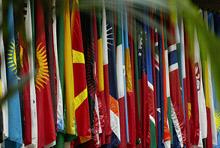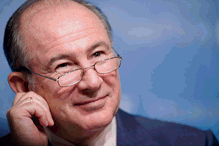
Typical street scene in Santa Ana, El Salvador. (Photo: iStock)
IMF Survey: IMF Reform on Track, de Rato Says
October 18, 2007
- IMF moving "in the right direction, and at the right pace," on reform
- Increasing convergence among members on aspects of new quota formula
- Financial market issues to be high on IMF's agenda in years ahead
Managing Director Rodrigo de Rato said reform of the IMF was on track, but improving the governance of the multilateral institution was a complex process that would take time and commitment from the 185 member countries.

IMF reports increasing convergence emerging among members on important aspects of new quota formula for institution (IMF photo)
MANAGING DIRECTOR'S PRESS BRIEFING
"Reform is not a sprint, but a long-distance run," he told a press conference ahead of the October 20-22 Annual Meetings of the IMF and the World Bank in Washington D.C. "The reform has a two-year calendar. By any standard, two years to reform an international institution with 185 members—nobody can say that's moving slow."
At the IMF-World Bank Annual Meetings last year in Singapore, the IMF's Board of Governors, representing all members of the Fund, approved a resolution initiating the reform plan, which is designed to revamp the representation of members to reflect recent changes in the global economy, while enhancing the participation and voice of low-income countries.
The revamp is part of an overhaul of the IMF's priorities and governance spelled out in de Rato's Medium-Term Strategy that covers the main fields of the IMF's work, including surveillance of the global, regional, and national economies; crisis prevention and lending; technical assistance for member countries; as well as governance of the institution.
Work on quota formula
After an initial round of ad hoc increases last September for four dynamic economies that were clearly underrepresented (China, Korea, Mexico, and Turkey), the IMF has now embarked on the second and more far reaching phase of the reform process, with completion envisaged by next year.
Changes being discussed include agreement on a new formula to guide the assessment of each member's representation in the IMF, reflected through its quota; a second round of ad hoc quota increases based on the new formula; and work on a proposal to increase the basic votes that each member possesses—a measure that would protect representation for low-income countries.
"To keep to our calendar, we are going in the right direction and at the right pace,"de Rato said in response to a question from a Chinese reporter. "Putting together 185 positions is not easy," he said, while pointing out that no other major international institution was tackling governance issues as directly as the IMF. De Rato said that nevertheless he was optimistic.
Increasing convergence
Increasing convergence was taking place among members on important aspects of a new quota formula. A consensus was emerging that the outcome should be a shift in quotas toward emerging and developing countries, with support growing for an increase in basic votes that goes beyond that agreed in Singapore. "These are essential features of the governance reform that we need to preserve the Fund's legitimacy," he added.
The quota issue will be discussed on October 20 by the IMF's International Monetary and Financial Committee (IMFC), which is also expected to note major progress over the past year in revamping the IMF's economic surveillance operations. The 24-member committee, which provides political direction and policy guidance to the IMF, will be chaired by Italian Economy and Finance Minister Tommaso Padoa-Schioppa, who was selected this month to succeed the U.K.'s Gordon Brown.
New Managing Director
The Meetings are the last that de Rato will attend as Managing Director. He steps down at the end of October, to be succeeded by former French finance minister Dominique Strauss-Kahn. Strauss-Kahn has said that he intends to press ahead with IMF reform, arguing that the institution that oversees the global economy must adapt to stay relevant in a globalized world.

De Rato at press briefing ahead of 2007 Annual Meetings: "Reform is not a sprint, but a long-distance run" (IMF photo)
De Rato told the press conference that the IMF had made progress on designing and reaching consensus on a new income model for the Fund. Work is under way to provide sustainable sources of income for the IMF. Some recommendations made by an independent panel—the so-called Crockett Report—are being shaped into proposals for a decision by the Fund's membership.
"On the expenditure side, we have implemented medium-term budgeting and have drawn up a budget which will cut expenditure by 6 percent in real terms over a three-year period into 2010," he stated.
Lessons from financial turbulence
In addition to IMF reform, the Washington Meetings will focus on the recent turbulence in world financial markets and prospects for growth.
In his opening remarks, De Rato said it was clear that the downside risks of the world economy are bigger than six months ago. At the same time, other risks that were already present had increased, too.
"The risks include a disorderly unwinding of global imbalances, a stronger push toward protectionism, higher oil prices, and emergence of national problems in some vulnerable emerging economies that have to finance large current account deficits with capital inflows," de Rato said.
De Rato added that recent market turbulence had revealed the range and the risks of financial globalization. Those at risk were not just loan originators in the U.S., but also banks in the U.K. and Germany, borrowers in Eastern Europe, and ultimately exporters in Asia and Africa. This pointed to the vital importance of multilateral cooperation on financial market issues, de Rato stated.
The IMF, with its near universal membership and its focus on both macroeconomic and financial issues, had a key contribution to make in the international effort to draw and apply lessons from the recent turbulence. Financial market issues would be high on the Fund's agenda not only at the 2007 Annual Meetings but in the years ahead, de Rato said.







